The Ultimate Guide to Selecting the Ideal Waste Container Services for Your Business
Proper waste management is crucial for businesses of all sizes and industries. Not only does it help maintain a clean and safe work environment, but it also ensures compliance with environmental regulations and can even lead to cost savings. Choosing the right waste container services is a key component of effective waste management, but with so many options available, it can be overwhelming to know where to start.
When selecting a waste container service provider, consider the following factors:
- Types of waste generated by your business
- Volume of waste produced
- Frequency of collection required
- Environmental credentials and transparency of the provider
- Customer service and support
- Pricing structure and fees
|
Factor |
Importance |
|
Waste Types |
High |
|
Waste Volume |
High |
|
Collection Frequency |
Medium |
|
Environmental Credentials |
High |
|
Customer Service |
Medium |
|
Pricing Structure |
High |
This ultimate guide will walk you through the process of understanding your business's waste management needs, exploring the various types of waste containers available, and evaluating potential service providers to help you make an informed decision.
Understanding Your Business's Waste Management Needs
Hey there, fellow business owner! Let's talk about something that might not be the most glamorous topic, but it's definitely important: waste management. Trust me, getting a handle on your company's waste situation is crucial for keeping things running smoothly and avoiding any nasty surprises down the line.
First things first, you need to figure out what kinds of waste your business is generating. It's like a little waste audit, if you will. You might have:
- Solid waste: Think paper, plastics, metals, and all that fun stuff.
- Liquid waste: This could be anything from used cooking oil to industrial wastewater.
- Hazardous waste: If you're dealing with chemicals, solvents, or other potentially dangerous materials, you'll need to be extra careful.
Once you've got a good idea of the types of waste you're working with, it's time to put on your quantitative hat and determine just how much of it you're producing. This will help you choose the right size of waste containers and figure out how often you'll need them emptied.
|
Waste Volume |
Collection Frequency |
|
Low |
Every 2-4 weeks |
|
Medium |
Weekly |
|
High |
Multiple times a week |
But wait, there's more! You'll also want to consider how frequently you need your waste collected. No one wants to be stuck with overflowing bins or smelly garbage piling up, right? Think about your business's unique needs and rhythms. A busy restaurant might require daily pickup, while a small office could get away with weekly or bi-weekly collection.
Remember, the key to efficient waste management is being proactive and staying on top of things. By understanding your business's waste needs, you'll be well on your way to finding the perfect waste container services to keep your space clean, green, and totally serene.
So, take a deep breath, dive in, and let's get your waste situation sorted out together!
Types of Waste Containers and Their Applications
Alright, let's dive into the wild and wacky world of waste containers! Trust me, there's more to it than just your standard garbage can. Different types of containers are designed to handle various kinds of waste, making your life easier and your waste management more efficient. Let's break it down, shall we?
First up, we've got the classic roll-off dumpster containers or boxes. These bad boys are perfect for construction sites, renovation projects, or any situation where you need to get rid of a lot of waste in a short amount of time. They come in different sizes, so you can choose the one that best fits your needs.
Next, we have tub style containers, which are great for disposing of heavy-duty waste like concrete or scrap metal. These containers have tapered sides, making it easy to dump out the waste when it's time to empty them.
If you're dealing with some seriously nasty stuff, you might want to consider sealed and sludge style containers. These are designed to handle hazardous waste and ensure that nothing leaks out during transport. They're like the superheroes of the waste container world, keeping everyone safe from harm!
Now, let's say you've got some waste that's a bit... well, watery. That's where dewatering boxes come in handy. These containers are designed to separate solid waste from liquids, making it easier to dispose of both components properly.
For the eco-conscious among us, recycler containers are a must-have. These containers come with special compartments for different types of recyclable materials, so you can keep your paper, plastic, and metal separate and ready for processing.
If you're in the industrial world, you might encounter vacuum boxes. These containers are used with vacuum trucks to collect and store hazardous materials, keeping them safely contained until they can be disposed of properly.
For those dealing with corrosive waste, poly boxes and poly tanks are the way to go. These containers are made from a special plastic polymer that can withstand even the harshest of chemicals, ensuring that your waste stays put and doesn't cause any damage.
Last but not least, we have frac tanks. These are the big guns of the waste container world, used primarily in the oil and gas industry for storing and transporting large volumes of liquid waste.
But wait, there's more! Let's not forget about our good friend, the dumpster rental. Whether you're tackling a short-term project or need a long-term solution for your waste management needs, renting a dumpster can be a game-changer. And if you have specific waste types, like concrete or yard waste, there are even specialty dumpsters available to make your life easier.
|
Container Type |
Application |
|
Roll-off containers |
Construction, renovation projects |
|
Tub style containers |
Heavy-duty waste (concrete, scrap metal) |
|
Sealed and sludge style containers |
Hazardous waste |
|
Dewatering boxes |
Separating solid waste from liquids |
|
Recycler containers |
Recyclable materials (paper, plastic, metal) |
|
Vacuum boxes |
Industrial waste, hazardous materials |
|
Poly box and poly tanks |
Corrosive waste |
|
Frac tanks |
Oil and gas industry, liquid waste |
|
Dumpster rental |
Short-term projects, long-term waste management |
So there you have it, folks! A whirlwind tour of the different types of waste containers and their applications. No matter what kind of waste you're dealing with, there's a container out there that's perfect for the job. And remember, when in doubt, always consult with a professional waste management company to ensure you're using the right container for your needs.
Choosing the Right Size Waste Container
Okay, so you've figured out what type of waste you're dealing with, and you're ready to dive into the world of waste containers. But hold up! Before you go all in, you need to make sure you're choosing the right size container for your needs. Trust me, you don't want to end up with a container that's too small (hello, overflowing garbage) or too big (goodbye, hard-earned cash).
So, how do you find that perfect Goldilocks fit? Well, there are a few factors to consider:
- The amount of waste your business generates
- The frequency of your waste pickups
- The space you have available for the container
Now, let's break it down. If you're a small office with minimal waste, you might be able to get away with a cute little 10-yard container. But if you're a bustling restaurant or a construction site, you might need to bump it up to a 20-yard or even a 30-yard container to keep up with all that waste.
|
Container Size |
Waste Volume |
|
10-yard |
Low |
|
20-yard |
Medium |
|
30-yard |
High |
|
40-yard |
Very High |
But wait, there's more! You also need to think about how often you want your waste picked up. If you're generating a lot of waste and you don't want it piling up like a scene from a horror movie, you might need to opt for a larger container or more frequent pickups.
And let's not forget about the space factor. You need to make sure you have enough room for the container on your property, and that it's easily accessible for the waste management company to pick up and drop off. No one wants to play a game of Tetris with a giant waste container!
If you're feeling a little overwhelmed, don't worry. Most waste container services will be happy to help you figure out the right size container for your needs. They're like the fairy godmothers of waste management, ready to wave their wands and make your waste disappear (okay, maybe not literally, but you get the idea).
So, take a deep breath, assess your waste situation, and don't be afraid to ask for help. With the right size waste container, you'll be able to keep your business clean, efficient, and ready to tackle anything that comes your way!
Evaluating Waste Container Service Providers
Alright, so you've got your waste situation figured out, and you know what size container you need. Now it's time to find the perfect waste container service provider to make your waste management dreams come true! But with so many options out there, how do you separate the best from the rest? Fear not, my friend, because I'm here to guide you through the process.
First things first, you want to look for a provider with a solid reputation and plenty of experience. These guys will be handling your waste, after all, so you want to make sure they know what they're doing. Check out online reviews, ask for references, and don't be afraid to do a little social media stalking (just kidding... sort of).
Next up, let's talk about environmental credentials. You want a provider that's not just talking the talk but walking the walk when it comes to being eco-friendly. Look for companies with a proven track record of recycling, zero waste initiatives, and other green practices. Bonus points if they have certifications to back it up!
Now, let's be real. No matter how great a company is, there will be times when you need a little extra help. That's why customer service is so important. You want a provider that's responsive, friendly, and ready to go the extra mile to keep you happy. Some key things to look for:
- 24/7 support
- Dedicated account managers
- Flexible scheduling
- Proactive communication
But wait, there's more! You also want to make sure your provider offers a wide range of services to meet all your waste management needs. Do they offer recycling? Hazardous waste disposal? Specialty containers for specific types of waste? The more comprehensive their services, the better.
Of course, we can't forget about the elephant in the room: pricing. While you don't want to skimp on quality, you also don't want to break the bank. Look for providers with transparent pricing structures and no hidden fees. Some things to watch out for:
|
Fee Type |
Description |
|
Overage fees |
Charges for going over your container's weight limit |
|
Rental fees |
Daily or monthly charges for using the container |
|
Environmental fees |
Charges for proper disposal and recycling |
|
Transportation fees |
Charges for delivery and pickup of the container |
Now, let's talk about dumpster rental specifically. If you're going this route, there are a few extra things to keep in mind. First, make sure you understand the rental terms and conditions. How long can you keep the dumpster? What happens if you need to extend the rental period? Are there any prohibited items you can't put in the dumpster?
You'll also want to consider delivery and pickup logistics. Where will the dumpster be placed on your property? Is there enough space for the delivery truck to access it? Will you need any permits or special permissions? A good provider will work with you to make sure everything goes smoothly.
Last but not least, don't forget about safety! Dumpsters can be dangerous if not used properly, so look for providers that prioritize safety. They should offer training and resources to help you and your team use the dumpster correctly and avoid accidents.
Phew, that was a lot of information! But don't worry, you've got this. Just remember to do your research, ask plenty of questions, and trust your gut. With a little bit of effort, you'll find the perfect waste container service provider to keep your business clean, green, and running like a well-oiled machine.
Ensuring Compliance with Waste Management Regulations
Okay, I know what you're thinking. "Compliance? Regulations? Snooze fest!" But hold on a second, because this stuff is actually super important. You don't want to be that business owner who ends up on the wrong side of the law because you didn't dot your i's and cross your t's when it comes to waste management.
First of all, let's talk about the EPA (Environmental Protection Agency). These guys are like the superheroes of the waste management world, making sure that everyone is playing by the rules. They've got guidelines for everything from how to store your hazardous waste to what kind of containers you should be using.
Speaking of hazardous waste, this is one area where you really don't want to mess around. If you're generating anything that could be harmful to people or the environment, you need to make sure you're storing it properly and disposing of it safely. That means using the right containers, labeling them correctly, and keeping them in a secure area until they can be picked up by a licensed hazardous waste disposal company.
But it's not just about hazardous waste. Even regular old trash has regulations around it. For example, did you know that in some areas, you're required to have a certain number of waste containers per employee? Or that there are rules about how often those containers need to be emptied? It's true!
So, how do you make sure you're staying compliant? Well, the first step is to educate yourself. Take some time to research the waste management regulations in your area and make sure you understand what's required of you. The EPA website is a great place to start.
Next, make sure you're working with a reputable waste management company that knows their stuff. They should be able to provide you with all the necessary documentation and permits, and they should be happy to answer any questions you have about compliance.
Finally, don't be afraid to ask for help! If you're ever unsure about something, reach out to your waste management provider or even the EPA directly. They're there to help you stay on the right side of the law and keep your business running smoothly.
So there you have it! Compliance might not be the most exciting topic, but it's definitely an important one. By staying on top of the regulations and working with the right partners, you can keep your business safe, clean, and compliant. And who knows, maybe you'll even have a little fun along the way!
Implementing Waste Reduction Strategies
Alright, folks, let's talk about everyone's favorite topic: waste reduction! Okay, maybe it's not exactly a thrilling conversation starter, but trust me, it's important. Not only is reducing waste good for the environment, but it can also save your business some serious cash in the long run.
First things first, let's start at the source. One of the best ways to reduce waste is to not create it in the first place! Take a good, hard look at your business practices and see if there are any areas where you can cut back. Maybe you can switch to digital invoices instead of paper ones, or maybe you can opt for reusable packaging instead of single-use plastics. Every little bit helps!
Another great way to reduce waste is to embrace the three R's: reduce, reuse, and recycle. I know, I know, it sounds like something straight out of a kindergarten classroom, but bear with me. By reducing the amount of waste you generate, reusing items whenever possible, and recycling everything else, you can make a big impact on your waste footprint.
Here are a few ideas to get you started:
- Implement a recycling program in your office or workplace
- Encourage employees to use reusable water bottles and coffee mugs instead of disposable ones
- Donate or sell old equipment and furniture instead of throwing it away
- Use biodegradable or compostable packaging materials whenever possible
But wait, there's more! Did you know that composting is another great way to reduce waste? If your business generates a lot of food waste, consider setting up a composting system. You can use the finished compost to fertilize plants or gardens, or even donate it to local farms and community gardens.
Now, I know what you're thinking. "This all sounds great, but where do I even start?" Don't worry, my friend, because that's where your trusty waste container service provider comes in. Many providers offer waste reduction consulting services to help businesses like yours develop and implement effective waste reduction strategies. They can help you conduct a waste audit, identify areas for improvement, and even provide training for your employees.
So, what are you waiting for? Start reducing your waste today and watch your business (and the planet) reap the benefits. And who knows, maybe you'll even have a little fun along the way! Just remember, when it comes to waste reduction, every little bit counts. So go forth and reduce, my friends!
Optimizing Dumpster Usage for Cost-Effectiveness
Hey there, savvy business owner! Let's talk about how you can make the most of your dumpster rental and keep those costs down. Because let's face it, nobody wants to throw money away (pun intended).
First up, let's talk about maximizing space. You want to make sure you're using every cubic inch of that dumpster to its fullest potential. It's like playing a game of Tetris, but with trash! Here are a few tips:
- Break down large items like cardboard boxes and furniture
- Stack items vertically whenever possible
- Distribute weight evenly to avoid overage fees
Speaking of overage fees, that brings us to our next point: monitoring your waste levels. You don't want to be caught off guard by a surprise bill because you went over your dumpster's weight limit. Keep an eye on how quickly your dumpster is filling up and schedule pickups accordingly. And if you're not sure how much waste you're generating, consider keeping a log or using a waste tracking app.
Another way to keep costs down is to prevent contamination. This means keeping your waste streams separate and avoiding any mixups that could result in extra fees. For example, if you're disposing of hazardous waste, make sure it goes in the designated container and not in your regular trash. The same goes for recyclables - keep them clean and uncontaminated to avoid any issues at the recycling facility.
|
Waste Stream |
Dumpster Type |
|
General Trash |
Regular Dumpster |
|
Recyclables |
Recycling Dumpster |
|
Hazardous Waste |
Specialty Dumpster |
Last but not least, don't underestimate the power of employee education. Make sure your team knows what can and can't go in the dumpster, and encourage them to be mindful of waste reduction. You could even make it a fun challenge or competition to see who can generate the least waste in a given week or month!
By following these tips and tricks, you'll be well on your way to optimizing your dumpster usage and keeping those costs down. And who knows, you might even have a little fun along the way! Just remember, when it comes to waste management, a little bit of planning and strategy can go a long way.
Dumpster Rental Safety Considerations
Alright, let's talk about something that might not be the most exciting topic, but it's definitely important: dumpster rental safety. I know, I know, it's not exactly the kind of thing you bring up at a dinner party, but trust me, you don't want to overlook this stuff.
First things first, let's talk about proper loading techniques. You might be tempted to just toss everything in there willy-nilly, but that's a recipe for disaster (and possibly a broken back). Make sure you're lifting with your legs, not your back, and don't overload the dumpster. It's not a clown car, folks!
Next up, let's talk about hazardous materials. I know it might be tempting to just chuck those old paint cans or batteries in with the rest of your trash, but that's a big no-no. These things need to be disposed of properly, or you could end up with a nasty chemical reaction or even a fire. No one wants to be the person who sets their dumpster on fire, trust me.
Another thing to keep in mind is placement. You want to make sure your dumpster is in a safe, accessible spot that's not going to cause any headaches for you or your neighbors. That means keeping it away from power lines, low-hanging branches, and any other potential hazards. And if you're putting it on a public street, make sure you've got all the necessary permits and safety equipment (like reflective tape or cones).
Finally, let's talk about public safety. If you're renting a dumpster for a construction site or other high-traffic area, you need to make sure it's properly secured and marked off. The last thing you want is some unsuspecting pedestrian taking a nosedive into your dumpster! Use caution tape, barriers, or even a temporary fence to keep people out.
I know safety might not be the most thrilling topic, but trust me, it's important. By following these simple guidelines, you can ensure that your dumpster rental experience is safe, stress-free, and maybe even a little bit fun! Just remember, safety first, and happy dumping!
Conclusion
Congratulations, my friend! You've made it through the wild and wonderful world of waste container services. By now, you should have a solid understanding of how to choose the best provider for your business needs such as DDD Dumpster Rental Eugene, whether you're dealing with hazardous waste, recycling, or just good old-fashioned trash.
Remember, the key to success is:
- Understanding your waste management needs
- Choosing the right size and type of container
- Working with a reputable, compliant provider
- Implementing waste reduction strategies
- Optimizing your dumpster rental for safety and cost-effectiveness
|
Factor |
Importance |
|
Reliability |
High |
|
Environmental Credentials |
High |
|
Customer Service |
Medium |
|
Pricing |
High |
So go forth and conquer the world of waste management, my friend! With the right waste container services by your side, there's nothing you can't handle. Happy dumping!
DDD Dumpster Rental Eugene
| Monday | 6:00AM – 10:00PM |
| Tuesday | 6:00AM – 10:00PM |
| Wednesday | 6:00AM – 10:00PM |
| Thursday | 6:00AM – 10:00PM |
| Friday | 6:00AM – 10:00PM |
| Saturday | 6:00AM – 10:00PM |
| Sunday | 6:00AM – 10:00PM |
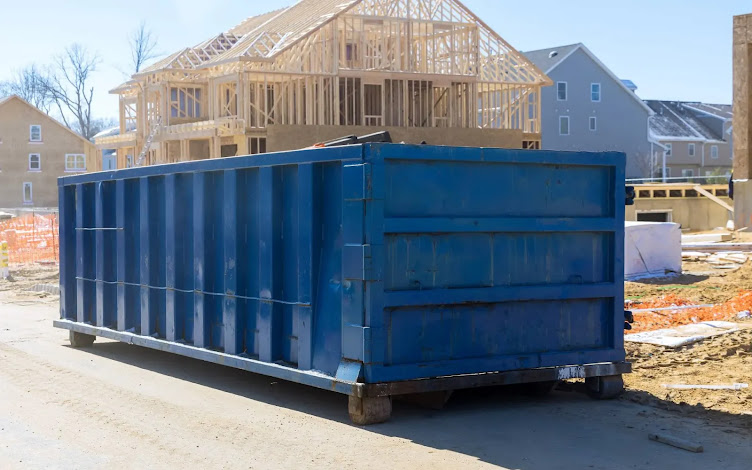
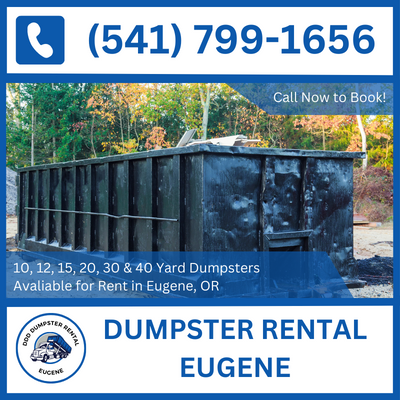
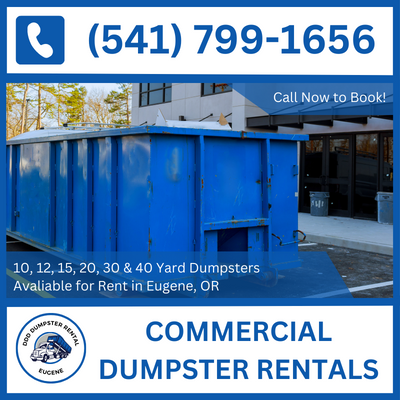
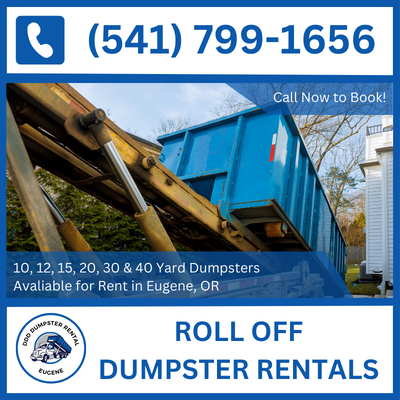
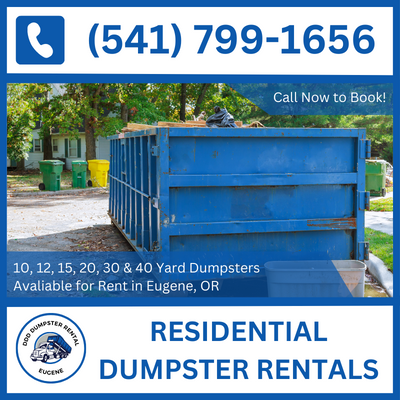
No comments:
Post a Comment